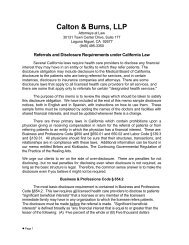Enhancing Your Practice's Revenue - California Orthopaedic ...
Enhancing Your Practice's Revenue - California Orthopaedic ...
Enhancing Your Practice's Revenue - California Orthopaedic ...
- No tags were found...
You also want an ePaper? Increase the reach of your titles
YUMPU automatically turns print PDFs into web optimized ePapers that Google loves.
• The hospital develops strategies for “targeted growth” asopposed to just “expense management.”• Marketing can focus on specific service lines, rather thanjust, “We’re the best.”The $64,000 Question: What RoleCan Orthopaedists Play in Co-managingService Lines?In the past, hospital executives were traditionally chargedwith overseeing the myriad services delivered in healthcareinstitutions. They came to the table equipped with a greatdeal of knowledge derived from their education, includingfinance, accounting, personnel management and so forth.Many however did not have clinical backgrounds thatwould enable them to understand the complexities ofpatient care. (Nursing was often an exception to this but,again, “nursing services” was typically a silo, independentof other silos.)Hospitals are increasingly recognizing the value of askingphysicians to help co-manage service lines because they dounderstand the complexities of patient care and have recentlymade great strides to improve their business acumen. Thephysicians receive payment in return for this assistance - -just like any other hospital executive. Conceptually, thearrangement is similar to using consultants or outside managersin private business. In that situation, the personnelare on specific projects. The consultants have a defined setof goals and are engaged for a predefined amount of time.They are paid based on time spent and/or goals achieved.In the case of orthopaedics, the service line could (a)cover all musculoskeletal care provided in the institutionor (b) focus on specific orthopaedic subspecialties such asadult hip and knee, spine, and/or trauma, where manyof the operations associated with the care of patients arecoordinated. Doctors can be compensated in a variety of ways,including an hourly, case-based, or annual wage. They mayalso receive bonuses based on clinical outcomes, patient satisfaction,improved operating room efficiencies and/or overheadmanagement, as stipulated by contracts.Why Is It Vitally Important for Hospitals to UseDoctors in Service Line Management?Hospitals have been asked by the Centers for Medicareand Medicaid Services (CMS) to launch focused initiativesto improve quality of care. In the future, it is likelythat payment will be increasingly based on successfuloutcomes, and not on a specific diagnosis, regardlessof what resources are allocated to treat that diagnosis.Physicians represent a logical partner to help the hospitalimprove quality of care delivered in the institution andthus maximize reimbursement that the institution receives.They can also help with cost management. Doctors canassume a variety of roles in service line management,ranging from overseeing patient flow to establishing “med/surg” purchasing guidelines to setting up audit programsmonitoring outcomes.How Do Hospitals and Physicians Go aboutDefining “<strong>Orthopaedic</strong> Service Lines?”Service lines can be defined in a number of different ways.One alternative relates to anatomic site or body system.This is easy in principle but can be confusing in practicesince multiple medical specialties can work within thecontext of any given site or system. It can also complicatecompensation arrangements if only one medical practice isengaged to manage a service line.The use of diagnosis related groups (DRGs) refinesthe body system approach because they classify hospitalcases into one of approximately 500 groups. This allowsthe hospital and the medical group to (a) come to closureregarding exactly what the service line will consist of froma clinical standpoint; (b) agree on what they jointly want toaccomplish; and (c) decide how physicians should be recognizedfor their contributions. Physicians and the hospitalalso need to identify how results will be tracked.The bottom line is that whatever the two parties ultimatelydecide constitutes the service line, is the service line.The line can involve some of the members of a medical sectionwithin a subspecialty in a given hospital system, or allof them. It can incorporate all associated ancillary services,or just some of them. And the line may or may not belinked, from a marketing perspective, with related lines.Specific Benefits of Service Line Co-managementThe “quality of care benefits” of including orthopaedicsurgeons in service line management have already beenmentioned above. Orthopaedists are in a good positionto help out in this arena because they are very focused onthe quality of the work they themselves perform both inthe office and the hospital. Since outcomes in inpatientorthopaedic care also depend on actions of hospital staff,functionality of equipment, and so forth, they tend to paya great deal of attention to “institutional issues” that mayarise. After all, if there is a poor outcome, regardless ofwho may be at fault, a lawsuit is likely to name both thephysician and the hospital.Another benefit relates to expense management. In theirown practice settings, orthopaedic surgeons are very awareof recent cost increases, including salaries, benefits, occupancy,and “med/surg” supplies. Many may be alreadyworking with their institutions on ways to trim unnecessaryexpenses in those institutions in such a way that quality isnot compromised. As business owners (versus employees)they truly understand that a dollar saved translates directlyto the bottom line.© 2011 American Academy of <strong>Orthopaedic</strong> Surgeons33
















